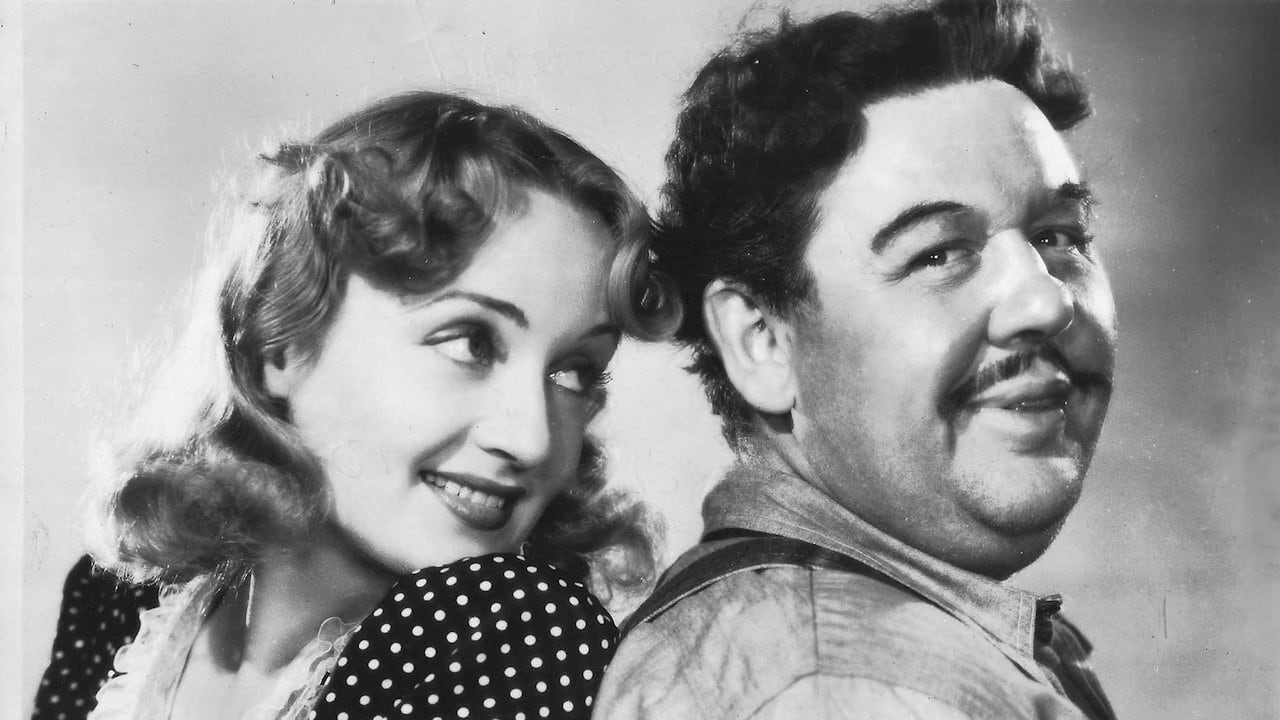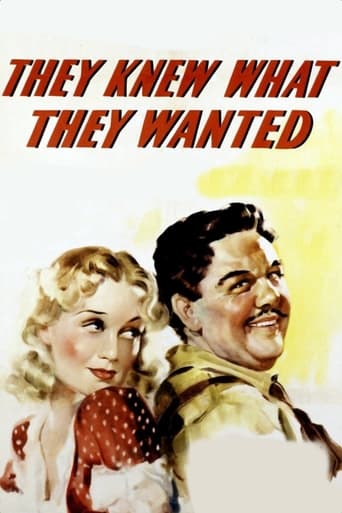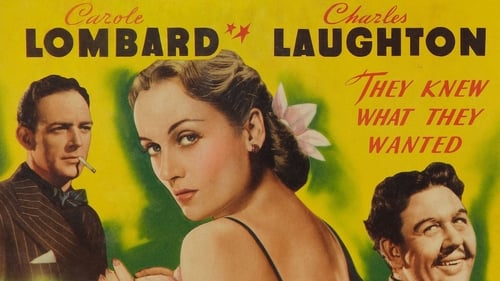


SERIOUSLY. This is what the crap Hollywood still puts out?
... View MoreI didn’t really have many expectations going into the movie (good or bad), but I actually really enjoyed it. I really liked the characters and the banter between them.
... View MoreClose shines in drama with strong language, adult themes.
... View MoreThe story, direction, characters, and writing/dialogue is akin to taking a tranquilizer shot to the neck, but everything else was so well done.
... View MoreI can only assume that before he started out in the role he asked the RKO excutives to run "Room Service" so that he could perfect his Chico Marx impression for this film.He wears a black curly wig not unsimilar to Marx,and apart from the fact that he does not play the piano he does everything else.So little wonder that this film had a very tortured production costing over $850000 and posting a loss of over $200000.It is difficult to understand why Laughton did these sort of films.He made some great films in the 1930s however he went to Hollywood more or less for good in 1939 and almost ruined his career in the 1940s withs some awful films.Lombard is fine but unbelievable as the waitress and Fay dreadful as the priest.
... View MoreThis is the third filmed version of Sidney Howard's play. Previously this was filmed a THE SECRET HOUR (1928) with Pola Negri and Jean Hersholt and as A LADY TO LOVE (1930) with Vilma Banky and Edward G. Robinson.Here, Charles Laughton plays the Italian Tony, a successful grape grower in Napa Valley. He goes to San Francisco and is smitten with a waitress named Amy (Carole Lombard) and decides to marry her. Back home he gets his pal (William Gargan) to write a letter. She answers back. Eventually they send a picture and invite her to Napa.Unfortunately they send a picture of Gargan. But Lombard has nothing to go back to but her dreary and demeaning job so she stays. Despite her best efforts she falls for Gargan right under Robinson's nose.Basically a love triangle story, there's enough humor to defuse the slightly clichéd story. Lombard give a great performance as the feisty Amy. Laughton is hammy and loud but a pleasure to watch. Gargan won an Oscar nomination for the hapless Joe, torn between his devotion to Tony and his love for Amy.Supporting cast includes Harry Carey as the doctor, Frank Fay as the priest, Victor Kilian as the photographer, Janet Fox as Mildred, and the film debuts of Karl Malden and Tom Ewell.Good location shooting in Napa Valley opens up the film and adds a nice touch.
... View MoreCharles Laughton, even more annoying than usual, full equipped with glued on beard and Italian accent, is a simple-minded farmer somewhere in napa.(wearing a pair of dungarees most of the time, which look like they might burst any second) having seen the waitress Carole Lombard only once, he's already very much in love with her and after writing some letters, proposes to her. being the coward that he is, he sends a photograph of his pal joe(equally unattractive William Gargan)to lure her to his farm in the desert. after a terrible accident(in which he falls off a roof while being completely wasted)Carol, his wife to be, finally gives in to her urges and has some fun with farmhand William Gargan.will their relationship survive this tragedy?? believe me after 96 min, (wich felt like 2 hours) you wont give a rats ass about those little lost souls in the middle of nowhere.and of course the upright local priest Frank Fay, who has such important lessons on life and love that you really wonder how one man alone can acquire such deep and meaningful knowledge is truly unforgettable.(pun intended)on the other hand, if you're into 400 pound guys imitating Italian farmers(badly) and pretending to be 3 years old(with baby talk and all)than this is the movie for you.i really wonder how Carole Lombard ever got into this nonsense. i got some (unintented) laughs out of this one, but overall its a real waste of time. if you wanna see gorgeous Carole Lombard in a good serious part watch Made for each Other.
... View More'They knew what they wanted' fits in very well with Garson Kanin's most famous films, the romantic comedies 'Bachelor Mother' and 'My Favorite Wife': a cynical view of the pieties of marriage, family and friendship; a larger-than-life paterfamilias who must rethink his most complacent assumptions: a spineless male hero who would rather run away from trouble he's caused than face up to it; a plot involving crossed-wires, mistaken identities and performances intended to deceive.It's good to remember the Kanin familiarities, because in many ways this is the above-mentioned films' polar opposite. It is based on a Pulitzer Prize-winning play, which not only means that the dialogue is stilted, the characterisation caricatured and the themes morose, but also means a combination of self-consciously 'heavy' issues (race, promiscuity, adultery, unwanted pregnancies, mail-order marriages - despite gaping plot euphemisms and ellipses) and lachrymose piety, in the noxious person of Padre McKee, an Irish priest whose status in the community is that of a luggage carrier, and yet who insists on sticking his oar in with a mixture of cruel jibes and other-worldly homilies.Tony Patucci is the larger-than-life Italian immigrant who has worked so hard in his new country that he now owns a huge vineyard ranch in Nava County, run by his foreman and trusty friend Joe, a migrant worker who spends his nights hustling women by the quays and is afraid of becoming too attached to his boss. On a vacation to San francisco, Tony catches sight of a life-hardened blonde waitress, Amy, and decides to marry her. He gets joe to write her a letter, and soon a correspondance ensues, resulting in Amy accepting Tony's proposal of marriage. Afraid that she will reject a fat Italian, Tony sends a photo of Joe, and so all the trouble starts. Even after the initial mix-up is cleared up, there is an obvious, though hate-filled, attraction, between Amy and Joe, and on the festive night before the wedding Tony drunkenly falls off his roof in an attempt to impress his new bride, leaving her and his friend wide open to temptation.Tonally, 'They knew' is a strange film, moving as it does from gentle rural comedy to sub-Eugene O'Neill tragedy. It is made with Kanin's customary skill, and he manages to made the material watchable for most of its running time. He skillfully captures the sun-cracked Eden of Tony's ranch, and the intimations of temptation, and it's a rare Hollywood film of the period that shows any kind of ethnic community positively, even if these Italians predictably sing, drink and perform dangerously macho feats.Some people think that 'They Knew' is racist, and that Charles Laughton's performance as Tony is not an intelligent attempt to reveal his character's inner-life, but a self-indulgent collection of stereotypical texts, perhaps on the level of ''Allo 'Allo'. It would be mean-spirited to accuse the film-makers of racism - they are clearly sympathetic to their hero, and presumably think his climactic act of violence does reveal character, rather than being the generic climax for all 'serious' American drama. Tony is never allowed go beyond being a naive, infantilised, figure of fun - he has no sexuality, he doesn't even seem to truly understand what Amy and Joe have done. This is deliberate - when Tony is on the roof trying to prove his masculinity, he falls, just as the friend he calls his 'son' is making progress with his bride: his act of sacrifice is his way of being a husband and father, without having to become a sexual adult, retaining his Christ-like innocence. We would now call this racist, or at least not thought through hard enough - as an Oedipal drama it lacks true physical weight, although Joe's exit into a dawn wasteland is visually powerful. But there is a strange scene where Tony is listening to 'Amos and Andy' on the radio: we, the audience, find ourselves watching a media representation of a racist stereotype listening to a media representation of racist steretotypes. Not for the first time in his career, Kanin's prickly intelligence forces us to rethink what we've been watching.
... View More